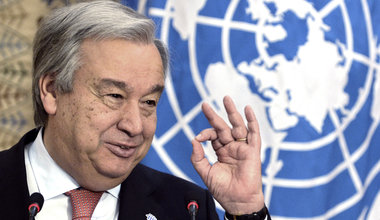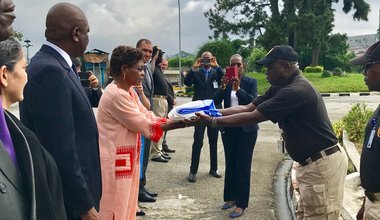STATEMENT ON THE SECOND ROUND OF THE PRESIDENTIAL ELECTION HELD ON 28 NOVEMBER 201
By Y.J. Choi, SRSG, UNOCI
(Abidjan, 8 December 2010)
1. The Ivorian people expressed their free will on 28 November 2010 to put an end to the Ivorian crisis and their suffering. The international community came to the people's assistance with massive investment, including the establishment of a peacekeeping mission. The holding of a successful election has been one of the keys to end the crisis.
2. Together, the Ivorian people and the international community are very close to succeeding. There was a successful presidential election with over 81% participation, except for the last minute confusion about its result. Yet there is no reason for us to remain confused because the will of the people as expressed on 28 November is irrefutable. Having achieved so much, we cannot fail at the last minute.
3. Yesterday, I explained my methods of certification to the Economic Community of West African States (ECOWAS) extraordinary session of Heads of State on Côte d'Ivoire held in Abuja and to the Security Council held in New York. On these occasions, I also reported that I would be making my methods of certification public today through a press conference in Abidjan with a view to putting an end to the confusion regarding the result of the 28 November second round of the presidential election.
4. Before I proceed with my explanation, let me say a few words about my impartiality in relation to the two opposing camps in Ivorian politics. Impartiality is so central that, if one does not believe in my impartiality, it would not be possible to believe in the truth that I am going to tell. Like democracy itself, impartiality is not given. It is something one can adhere to only through ongoing efforts, a stake that I cannot afford to lose as certifier of the Ivorian elections. Many times, most of the time gently, but often not so gently, I have been cited alternatively by the government and the opposition camps as taking sides with the other party whenever UNOCI refused to side with it. I say with conviction that UNOCI has remained impartial. I present this as the evidence that I have succeeded in safeguarding my impartiality, the strength upon which I today lay the unequivocal result of the second round.
5. Let me now share with you the three methods that I have applied to arrive at the absolute conviction regarding the winner of the second round of the presidential election. I must stress that my certification was conducted without regard to the methods used and result proclaimed by either the IEC or the Constitutional Council.
6. The first method was based on finding the voting trends as early as possible. In order to do so, 721 devoted UNOCI staff members were deployed to an equal number of carefully pre-selected polling stations throughout the country. They reported to me by phone the results of the second round posted in those polling stations on the evening of 28 November. I needed these results as a means to enhance the credibility of the final result I would be obtaining with my third method. But as certifier I could not share these results with anybody until I completed my analysis and evaluation through the other two methods.
7. The second method was to collect the electoral results from the nineteen regional local electoral commissions. In order to do so, as early as one week before the election, nineteen UNOCI staff members were identified and given the task of collecting the results. Every one of them duly reported his/her findings to me on 30 November. The collation of their reports further confirmed the trends I had obtained two days earlier i.e. at that moment it was almost certain who had won and who had lost the election but, as a certifier, I had to be absolutely certain about the result. I needed a third method.
8. The third method was to examine all the 20,000 tally sheets that UNOCI received on 30 November from the Ivorian authorities for the purpose of certification. In order to do so, a tabulation centre was set up at UNOCI HQ and 120 UNOCI staff members, who had been trained weeks ago, worked in three shifts, day and night. The training was necessary as the job did not involve a simple collation. It involved examining one tally sheet after another to see whether there was a trace of fraud or manipulation, especially including whether the tally sheets had been signed. As a result, it was inevitable for us to discard a certain number of tally sheets. We checked whether these discarded tally sheets were concentrated in some particular regions or if they were randomly spread. The latter was the case. This task was completed by the evening of 2 December.
9. The moment of truth had come for me as certifier. The collated result showed almost identical percentages as those of my second method. Moreover, percentage wise, the trends I had obtained from the first method were very close to those resulting from the second and third methods. It was then absolutely clear to me that the Ivorian people had made their choice without any doubt on the winner of the second round of the presidential election.
10. Now let us examine the complaints about "irregularities" related to the elections submitted by President Gbagbo's camp, which were used as a basis for the 3 December Constitutional Council's proclamation. UNOCI examined them carefully as it had received a copy of these complaints. The complaints were based on two essential arguments: the first relates to the use of violence in nine departments in the North which prevented people from voting; the second relates to the tally sheets in those departments which lacked the signature of the presidential camp's representatives.
11. I, as certifier, during my press conference last Friday, certified that the Constitutional Council's proclamation was not based on facts. Here is how and why. A participation rate as high as 81 per cent cannot possibly mean that there was sufficient violence to prevent people from voting. Fortunately, on election day, I had asked UNOCI's Police Commissioner to collect all the reports on violence and draw a consolidated map showing the intensity, frequency and location of violence. The map shows that, there were fewer violent acts in the North than in the West.
12. The second complaint of President Gbagbo's camp was about the tally sheets which lacked the signature of President Gbagbo's representatives. However, in the interest of due diligence, regardless of the acceptability of this argument from a legal point of view, to be absolutely certain, I reviewed all the tally sheets in the concerned departments and eliminated all those which lacked the signature of President Gbagbo's representatives. The upshot was that, even such an exercise did not alter in any significant way the outcome of the second round.
13. It is worth mentioning that, all through the electoral process, I instructed my staff not to carry out polls as they might have been exploited by political parties to damage UNOCI's impartiality. I further asked my staff not to have any preference between the candidates because, again, this would have been inevitably leaked and exploited by politicians to damage UNOCI's credibility.
14. On this basis, I remain absolutely certain that I have found the truth concerning the will of the Ivorian people as expressed on 28 November. The will of the people points to one conclusion, that the people have chosen one person, not two, as the winner of the presidential election: the Ivorian people have chosen Mr. Alassane Ouattara with an irrefutable margin as the winner over Mr. Laurent Gbagbo.
15. By saying this, I am not at all interfering in Ivorian affairs. As certifier of the Ivorian elections, I am only doing my job as accepted by the Ivorian authorities. In terms of certification of elections by the United Nations, Côte d'Ivoire is the first case ever in Africa. The United Nations did not seek this responsibility; it was requested to play the certification role by Ivorian leaders by virtue of the 2005 Pretoria Agreement. This is a solemn responsibility that the United Nations has towards all Ivorian people, who deserve peace, stability, prosperity and the respect of their will.
16. Considering the distance Côte d'Ivoire has travelled, ignoring the will of the Ivorian people at this stage would be a let-down of the people of Côte d'Ivoire and a waste of significant resources invested over the past eight years by the international community and the Ivorian people.
 ONU
ONU Nations Unies Maintien de la paix
Nations Unies Maintien de la paix



